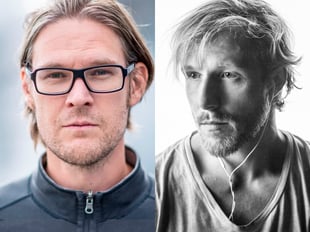

ANIMAFEST PRO | ANIMAFEST SCANNER VI | SIMPOZIJ O SUVREMENOJ ANIMACIJI | ANIMAFEST SCANNER VI - PANEL 4: ANIMACIJA I OBRAZOVANJE
„Svatko je redatelj” – primjeri kolaborativne, lančane animacije u obrazovanju - Jürgen Hagler, Remo Rauscher
Professional production pipelines are an integral part of the curriculum at universities and schools for animation. Student films are usually directed by one person and produced by a small team. By contrast, so-called chained animations are based on a large group of animators. The final film's snippets can be equally divided among the producing members or even groups of animators. Therefore this approach is highly suitable for an average number of 30 to 50 students being enrolled in animation classes at educational institutions. In addition to teaching basic animation principles, this experimental type of production goes beyond the common practices of exercise. By using easy-access animation techniques, the participant’s prior experiences in animation hardly matter. Within this flat hierarchy, all members can consider themselves as an integral and equally valued member and get involved into conception, seeking for intrinsic aspects of motivation by collecting the group’s interests. This leads to a very dynamic and unpredictable process of conceptualisation, facing many challenges like bringing together a broad range of ideas, styles and techniques. In addition to synergies in teamwork and creativity, the students have to interact and organize their pipeline mostly independently. The intention to present the collaborative project to the public (e.g.: film festivals) results in profound identification in contradiction to educational routines. Based on the cases studies Home (2016), Utopia Now (2017), Draft One (2018), and Golden Cage (2019) different experimental approaches, challenges and findings will be discussed.
Dr. Jürgen Hagler is an academic researcher and curator combining animation, game and media art. He studied art education, experimental visual design and cultural studies at the University for Art and Design in Linz, Austria. Currently, he is a Professor of Computer Animation and Media Studies in the Digital Media Department at the Hagenberg Campus of the University of Applied Sciences Upper Austria. He became the programme coordinator for the Digital Arts master’s degree programme in 2009. Since 2014 he is the co-head of the research group Playful Interactive Environments with a focus on the investigation of new and natural playful forms of interaction and the use of playful mechanisms to encourage specific behavioural patterns. He has been involved in the activities of Ars Electronica since 1997 in a series of different functions. Since 2017 he is the director of the Ars Electronica Animation Festival and initiator and organizer of the symposium Expanded Animation.
Remo Rauscher is an independent animation artist within the fields of film, theatre and performance focusing on the fusion of digital and analogue techniques. Graduated in Computer Animation and Postproduction (2010), he is managing Prix Ars Electronica’s animation festival in research and acquisition (2011) and supervising the classes of Analogue Animation at University of Applied Sciences, Campus Hagenberg (2012).


